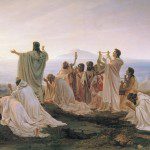According to the Bible, certain “birth pains” will presage the end of this world and the start of the next. Especially intriguing is the prediction in Matthew 24:24: “For false messiahs and false prophets will rise up and perform great signs and wonders so as to deceive, if possible, even God’s chosen ones.”
Who exactly are these bedazzling, would-be saviors? We can only guess, but today’s devout technologists certainly fit the bill.
Think about it. Technology—be it the web or a vaccine—is messianic because it delivers us from serious, even life-threatening inconveniences or disadvantages. My mother lived for five years after being diagnosed with stage-four breast cancer because of medical technology. Cell phone communication saves lives every day. Industrial robots spare humans from performing dangerous tasks, such as handling molten metals or radioactive materials.
Today, there seems to be no limit to the “great signs and wonders” of modern technology. Artificially intelligent prosthetics are restoring dignity and independence to people who have lost their arms and legs. Artificial retinas are restoring sight to the blind. Modern space technology has landed ships on Mars, a pair of asteroids, and even a comet. In the minds of many today, these are out-and-out miracles, rivaling those performed by Jesus himself.
No wonder that when Mark Zuckerberg prophesies a better future through social media the world is inclined to believe him. “People sharing more—even if just with their close friends or families—creates a more open culture and leads to a better understanding of the lives and perspectives of others,” he wrote in 2012, when taking Facebook public. “We believe that this creates a greater number of stronger relationships between people, and that it helps people get exposed to a greater number of diverse perspectives.”[1]
I won’t question Zuckerberg’s sincerity, but he has clearly turned out to be a false messiah. In bringing us together, social media is not making the world a more understanding, more loving place. It appears to be driving us apart—like a football stadium, where rivalries are amplified, not dampened.
One such deafening amplification swamped the 2016 U.S. presidential campaign. Hateful posts, messages, and Tweets from all sides—Republicans, Democrats, Greens, Libertarians—amped up our differences so much that many months after the election, we are still at each other’s throats. As a Baby Boomer, I’ve never witnessed anything like it.
Facebook is also facilitating the rise of fake news and of people using its live feature to broadcast suicides, rapes, shootings, and other heinous deeds. Facebook has also been a boon to terrorists using it to communicate their evil schemes around the world at the speed of light.
Yet Zuckerberg continues pressing his false if sincere narrative and growing richer and richer in the process. Recently, he preached about the possibility of Facebook taking the place of a traditional church. “It has a pastor who cares for the well-being of their congregation, makes sure they have food and shelter,” he said at a communities summit in Chicago. “If we can do this, it will not only turn around the whole decline in community membership we’ve seen for decades, it will start to strengthen our social fabric and bring the world closer together.”[2]
Truthfully, doesn’t that sound like the prediction we read in Matthew? “For false messiahs and false prophets will rise up and perform great signs and wonders so as to deceive, if possible, even God’s chosen ones.”
Zuckerberg is but one of technology’s many false messiahs and false prophets. Think of Sir Tim Berners-Lee, who invented the Internet and gave it to the world for free in hopes it would benefit humankind. In many ways it has, but trolls have increased the level of public incivility and hackers have endangered our way of life.
Think of Elon Musk, Rodney Brooks, Larry Page, Sergey Brin, Tim Cook, Craig Venter, Sir Venki Ramakrishnan—the list of technology’s high priests promising us a heavenly future is long, and their stupendous material wealth is unprecedented. Yet most of their prophesies will continue turning out to be false, I predict, for one simple reason: technology can deliver us from many of the world’s problems, but not from ourselves.
“I fear evolution has inbuilt greed and aggression to the human genome,” Stephen Hawking said recently. “There is no sign of conflict lessening, and the development of militarized technology and weapons of mass destruction could make that disastrous.”[3]
Hawking blames our errant nature on our genes, on the dictates of evolution; the Bible blames it on our free will, our choice to rebel against God. Either way, the result is the same: wherever technology takes us, there we will be. It’s like upgrading the furniture on the deck of the Titanic.
Technology has been around for nearly as long as we’ve existed, but now the stakes are very high. Automobiles replacing horses was disruptive, but land- and space-based cybertechnology, nuclear and biological weapons, and superbugs spawned by an overuse of modern antibiotics have the power to wipe us out.
The more I contemplate technology’s long history of failed promises, the more I believe people hyping today’s dazzling but potentially perilous innovations are precisely the false messiahs and false prophets of which the Bible speaks. Time will tell if my hypothesis is correct.
For now, this much is clear. Things have not panned out the way technology’s false prophets and false messiahs promised. But they do appear to be progressing precisely as foretold many centuries ago by the prophets and Messiah of the Bible.
Michael Guillen,[4] Ph.D., former Emmy-winning ABC News Science Editor, taught physics at Harvard and is now president of Spectacular Science Productions. His novel, The Null Prophecy,[5] debuts July 10.
References:
- http://business.time.com/2012/02/01/read-facebook-ceo-mark-zuckerbergs-ipo-letter/
- http://www.cnbc.com/2017/06/26/mark-zuckerberg-compares-facebook-to-church-little-league.html
- http://www.bbc.com/news/science-environment-40461726
- www.michaelguillen.com
- https://www.amazon.com/Null-Prophecy-Michael-Guillen/dp/162157671X/ref=tmm_hrd_swatch_0?_encoding=UTF8&qid=&sr=














